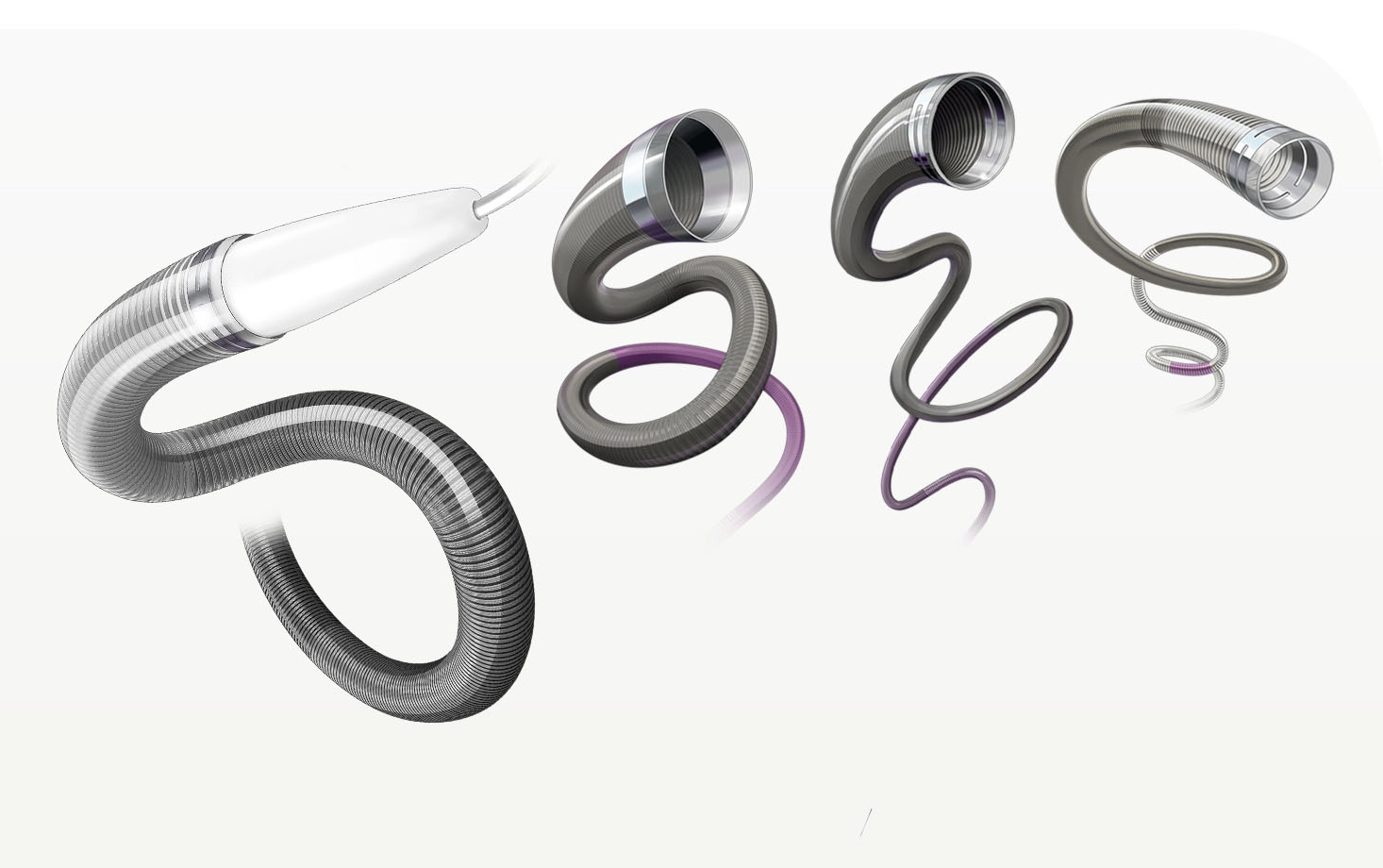
-
Penumbra’s RED® Reperfusion Catheters (RED 72 SILVER LABEL, RED 72 SILVER LABEL with SENDit® Technology, RED 68, RED 62, and RED 43) are intended for use in the revascularization of patients with acute ischemic stroke.
Every case is different, and the RED family of catheters provides a full range of products designed to optimize lumen size and trackability for the situation. All five products feature new REDglide™ Technology, which is designed to improve catheter interaction with vessels and to enhance delivery in tortuosity.
-
RED 72 SILVER LABEL is our latest large-bore Reperfusion Catheter, which provides the highest TRF on the marketa and is optimized for navigating challenging anatomy in LVO.
- SILVER LABEL Technology: Blended transition zones designed for enhanced performance in challenging anatomy
- .072″ (1.83 mm) Lumen: Delivers highest TRFa
- .085″ (2.16 mm) Outer Diameter: Articulating marker band design to improve tip softness
- REDglide Technology: Enhanced distal hydrophilic coating for smooth trackability
- 132 cm Length: To reach target vessels
a. As compared to AXS Vecta™ 71 and Stryker® (Medela), LBC and Vacuson 60, React™ 71 and Riptide™, AXS Vecta 74 and Stryker (Medela), and Zoom™ 71 and Zoom pump. Thrombus Removal Force (TRF) = (Catheter Tip Area) × (Vacuum). Sources: company website, marketing literature, IFU, and data on file.
-
RED 72 SILVER LABEL is our latest large-bore Reperfusion Catheter, which provides the highest TRF on the marketa and is now available with SENDit Technology. SENDit Technology is designed to simplify preparation and ease delivery of RED 72 SILVER LABEL.
- 50% more trackable than original RED 72 with SENDit Technologyb
- Blended transition zones designed for optimized compatibility with SENDit Technology
- Preloaded in RED 72 SILVER LABEL for simplified setup
- 1 Flush Point for quick preparation
- Occupies 99% of RED 72 SILVER LABEL lumenc
- Tapered 1.5 cm distal tip designed for close clot proximity
- .014″ wire compatible
- Intended for use with BENCHMARK™ BMX®96 Access System
b. Tests performed and data on file at Penumbra, Inc. Testing performed evaluated the gram-force (gf) required to push aspiration system to 30 cm displacement in a tortuous glass model using an Instron® machine. Bench results may not be indicative of clinical performance. Physicians’ treatment and technique decisions will vary based on their medical judgment. Individual results may vary depending on patient-specific attributes and other factors. Test systems included the Penumbra RED 72 with SENDit Technology and the RED 72 SILVER LABEL with SENDit Technology.
c. Data on file at Penumbra, Inc. -
RED 68 is our medium-bore Reperfusion Catheter, which combines the best of both worlds, trackability, and efficient clot engagement.
- .068″ (1.73 mm) Lumen: Delivers powerful aspiration
- .084″ (2.13 mm) Outer Diameter: Atraumatic tip design for improved navigation
- REDglide Technology: Enhanced distal hydrophilic coating for smooth trackability
- 132 cm Length: To reach target vessels
- 16 Material Transitions: Optimized for performance in challenging anatomy
-
RED 62 is Penumbra’s most versatile Reperfusion Catheter, providing advanced trackability even in the most challenging anatomy.
- .062″ (1.57 mm) Lumen: Delivers powerful aspiration
- .076″ (1.93 mm) Outer Diameter: Low profile for easy access
- Atraumatic Design: Engineered to effortlessly navigate tortuous anatomy
- 138 cm Length: To reach target vessels
- 11 Material Transitions: Optimized for performance in complex distal anatomy
-
RED 43 advanced trackability provides smooth delivery of our large-bore catheters, as well as provides strong distal aspiration.
- .043″ (1.09 mm) Lumen: Delivers powerful distal aspiration
- .060″ (1.52 mm) Outer Diameter: Low profile and atraumatic design for distal deliverability
- Compatible with RED 62, RED 68 and RED 72 SILVER LABEL: Optimized lumen occupation
- REDglide Technology: Designed to enhance delivery in tortuosity
- Precision Tip: Articulating marker band with short polymer tip for optimal visualization and placement
- Full-Length PTFE Liner: Designed for durability and lumen integrity under powerful aspiration
- Proximal Hybrid Stainless Steel & Nitinol Coil Wind: Engineered to provide optimal support
- 160 cm Length: To reach target vessels
-
- Delivers and maintains nearly pure vacuum (-29.2 inHg or -98.88 kPa)d
- Simple setup
- Integrated clot catcher
- Disposable Penumbra ENGINE® Canister
- Compatible with all Penumbra System® Reperfusion Catheters
d. Data on file at Penumbra, Inc.
RED 68 Highlight Video
RED 62 Highlight Video
RED 43 Highlight Video
RED Reperfusion Catheters
Resources
-

-

-

Therapies & Conditions
Learn more about how our products are used for a broad spectrum of conditions.
-

Request a Demo
Want to see Penumbra products in action? Request a demonstration for your facility.
